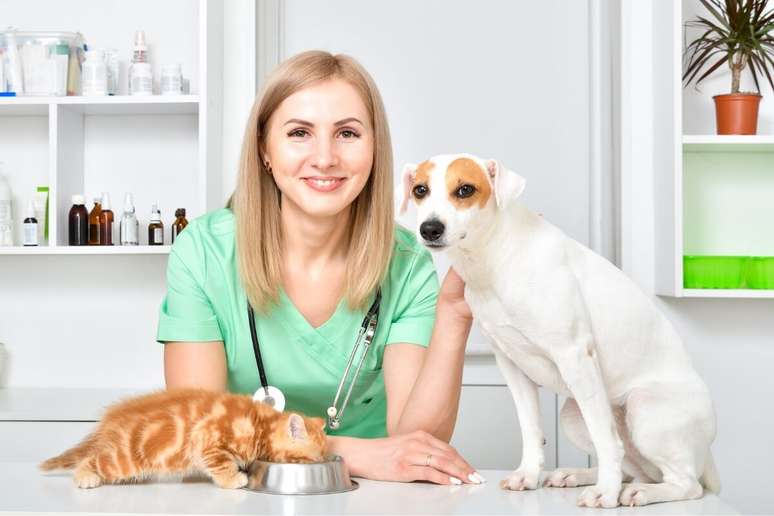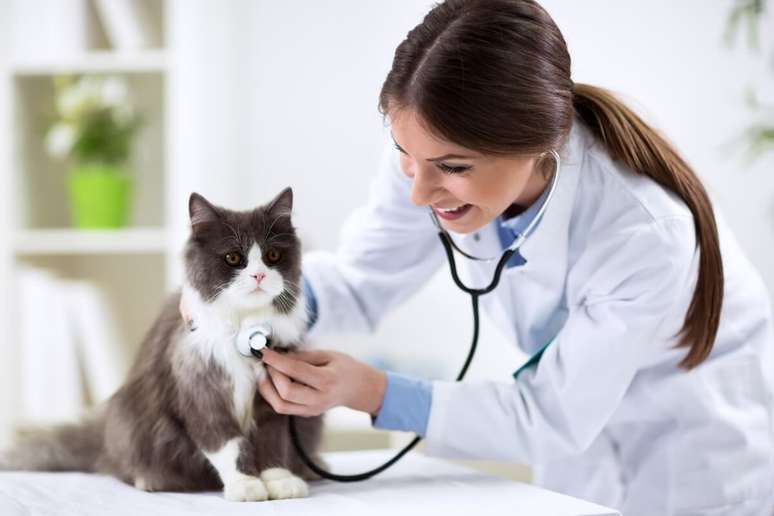Find out how each can help your pet and when to seek specialized care
The veterinarian plays an essential role in the health of pets, preventing, diagnosing and treating diseases to ensure quality of life. Just like human medicine, veterinary medicine also has specialties that meet the specific needs of patients. pets.
There are currently 17 specialties recognized by the Federal Council of Veterinary Medicine (CFMV), the body that regulates the title of specialist in Veterinary Medicine and Animal Sciences. To obtain the title, the veterinarian must undergo tests prepared by bodies authorized by the CFMV.
In this context, knowing which professional to look for in different situations can avoid complications, ensure accurate diagnoses and provide more effective treatments for animals. Below, discover some of the veterinary specialties and find out when it is advisable to request each service!
1. Cardiology
Veterinary cardiology is dedicated to the diagnosis and treatment of related problems Heartsuch as heart murmurs, arrhythmias and heart failure. Breeds such as the poodle and Chihuahua, as well as older dogs and cats, are among the most vulnerable to heart disease. If you notice symptoms such as excessive tiredness, coughing, or fainting, it is important to consult a veterinary cardiologist for diagnosis and appropriate treatment.
2. Dermatology
Dermatology deals with problems that affect the skin, hair and nails of animals, such as dermatitis, allergies, fungi and parasites. It is important to see a dermatologist if you notice persistent itching, excessive hair loss, or sores on your skin. This specialist can carry out tests to identify the source of the problem and indicate the appropriate treatment to improve the patient’s quality of life. pet.
3. Oncology
With the increase in life expectancy of petsTHE cancer diagnosis has become more common. Veterinary oncologists are responsible for identifying and treating different types of tumors through surgery, chemotherapy and, in some cases, radiation therapy. If you notice lumps, sudden weight loss, non-healing wounds, or changes in your pet’s behavior, seeing an oncologist as soon as possible can increase the chances of successful treatment.
4. Ophthalmology
Ophthalmology takes care of eye health petsdiagnosing diseases such as cataracts, glaucoma and corneal ulcers. Eye infections and changes in tear production are signs that require a visit to a specialist. Vision is essential for the animal’s orientation and early diagnosis can prevent partial or total loss of vision.

5. Nutrition
Veterinary nutrition develops customized diets for animals with specific needs, such as obesity, diabetes and food allergies. In addition to providing guidance on the transition to natural nutrition, the nutritionist also monitors weight and adapts the diet based on the child’s life stage. pet. Consultation is recommended to ensure a balanced and healthy diet at all stages of the animal’s life.
6. Intensive veterinary medicine
Intensive veterinary medicine is dedicated to the care of animals in critical situations, such as severe trauma, poisoning, acute illness or emergency surgery. These professionals work in an integrated manner with other specialties, guaranteeing 24-hour assistance to patients in serious conditions. It is important to seek this type of assistance in immediately life-threatening situations, such as car accidents, uncontrollable seizures, or severe breathing difficulties.
7. Acupuncture
Veterinary acupuncture is a practice based on traditional Chinese medicine, which seeks to rebalance the body by stimulating specific points on the animal’s body. This technique is used to relieve chronic pain, improve blood circulation, and treat neurological, muscular, and even behavioral problems, such as anxiety. It is also indicated as a complementary treatment for conditions such as arthritis, herniated disc and paralysis, as well as aiding in post-operative recovery.
8. Endocrinology
Veterinary endocrinology focuses on the diagnosis and treatment of hormonal diseases, such as diabetes mellitus, hypothyroidism, hyperthyroidism, and Cushing’s syndrome. These problems occur due to an imbalance in the production of hormones by the glands, which affect the animals’ metabolism and behavior. Signs that you need to see an endocrinologist include sudden weight gain or loss, excessive thirst, increased hunger, lethargy, and changes in hair coat.
Source: Terra
Ben Stock is a lifestyle journalist and author at Gossipify. He writes about topics such as health, wellness, travel, food and home decor. He provides practical advice and inspiration to improve well-being, keeps readers up to date with latest lifestyle news and trends, known for his engaging writing style, in-depth analysis and unique perspectives.






![[Coluna] Does Brazilian protectionism inspire Trump? [Coluna] Does Brazilian protectionism inspire Trump?](https://p2.trrsf.com/image/fget/cf/774/0/images.terra.com/2025/10/16/2008907400-74231636354.jpg)

